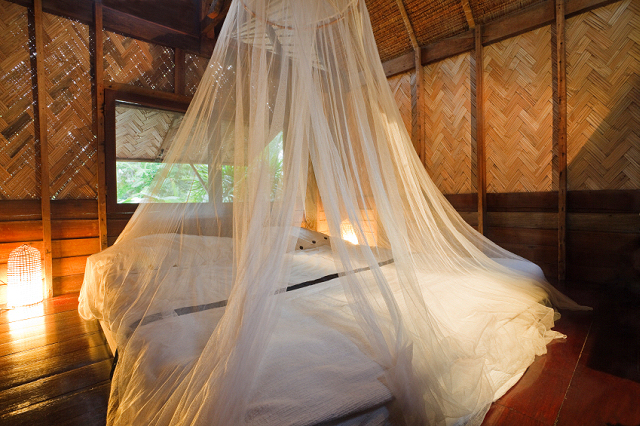HomeStream
News & more!Escapes
My trip reviewsGallery
My travel photosPlanning
Trip planningGuides
Destination guides
Escape Hunter  Planning
Planning  Insect Bite Prevention Techniques
Insect Bite Prevention Techniques
Insect Bite Prevention Techniques
Afraid of tigers, afraid of snakes?
Tiny ticks and mosquitoes can be just as deadly!
But there a few simple things that can save your health and your life.
First, let's see what types of insects you could encounter during a trip and what they spread.
Of course, there are many... And I will only enumerate a small number, can't go into the details of the entire Amazonian jungle's biting insect fauna.

Source: © iStock.com/stephane106
#1 Areas of high risk, places where diseases spread most
In and around lakes, swamps, lakes, rivers, places with plenty of water are full of all sorts of insects.
Flies and mosquitoes roam around these areas, while they don't like dry and sunny places, they prefer wet, warm areas and they come out when the Sun doesn't shine too bright (late afternoon, evening, night time).
Ticks thrive in wide grassy areas, generally sunny fields, green hills - not so much in dark shady dense forests.
Ticks can spread lyme disease, but regardless of that, if a tick enters human body, it generally remains stuck and dies inside, causing infection.
Medical intervention is necessary to remove the tick, sometimes this can implicate surgery.
Some dangerous poisonous exotic insects live in wet green areas and canals, around water bodies.
Poisonous centipedes are wide-spread in Asia's green areas, but there are species living in deserts as well. Centipede bites can be very painful, can cause swelling, fever, nausea, but generally they're not fatal.
Mosquitoes and flies are almost everywhere. But they thrive around animal farms (and generally around the animals), wet areas (river beds, lakes, swamps etc.) and green areas like parks.
Some of the most dangerous and deadly diseases are spread by the least brutal-looking small mosquitoes! A tiny bite can get you sick of malaria, dengue fever, yellow fever, encephalitis and other diseases - potentially deadly!
#2 First of all, avoid wet damp areas
Especially late in the afternoon, in the evening, at night. That's when most insects come out.
Mosquitoes and flies roam around sewage systems in cities, even small water bodies - the tiniest water-filled ditch can be home to a colony for thousands of insects.
Especially if you're traveling to an exotic country, it's best to avoid the wet areas from late afternoon until next morning.
During the darker hours you have the highest chance for getting bitten.
Some insects live in the walls of mud houses. Especially in Latin America, these insects pose an elevated threat.
Keep away from these houses and don't get close to mud walls.
#3 Avoid vast open grassy areas
Grassy fields and even semi-wild wild grassy areas pose a high risk. They can be full of ticks.
Around farms and places where there are many animals (cows, sheep, dogs etc.) also attract ticks.
These insects can easily bite through animal skin, but when they bite humans, they're more dangerous, because they tend to get stuck.
It's not just the tick bite-caused pain, but also the vast amount of diseases that they spread that poses high risk.
Don't lie down in green areas, unless you're certain that it's a well-taken-care-of urban area.
It's less likely that you get bitten by ticks in London's Green Park or a park in central Tokyo, but if you wander to cities' peripheral areas or lie down in a wild area or semi-wild area, like a pastry, or during a hike...
#4 Wear neutral-coloured clothes
Mosquitoes and other insects are generally attracted by dark clothing. But the African tsetse flies are actually attracted by bright/light-coloured clothing. So there is no general rule!
Dress in a way that it's nor dark, nor too bright.
Adequately coloured clothing will keep them away. If your colours are attracting attention, you will magnetically attract the danger.
#5 Wear long-sleeved clothes
To ensure protection, make sure you don't leave much skin uncovered.
Generally it's the arms and legs that get most often bitten, only because they're exposed.
#6 Tuck your pants' sleeves inside your socks, boots
If you're in an area of elevated risk, this is an appropriate measure to block insects from getting under your clothing.
Some travelers resort to tapes and other methods to keep the sleeves tight.
#7 Avoid sandals, use boots, shoes instead
Needless to explain how high your exposure will be in sandals...
Make sure your shoes or boots are tight enough around the ankle are so that no insect can get in and before putting them on, verify if any insect could have gotten in.
#8 Insects are attracted by warmth, sweat
You should know that if you're wet, the insects will find you more "delicious". They can find you by your body warmth easily, even in the dark.
Unfortunately there's not much we can do about body warmth. Perhaps make sure you're wearing dry clothes and minimize signs of sweat on your body.
#9 Insects can bite through thick clothes
Even the most common, weak-looking mosquito can bite through jeans, even jackets!
I did get a few bites through 2 layers of thin clothing and I was very surprised... my mistake was that I was walking around a wet sewage area in Kuala Lumpur and I was wearing a dark grey jacket (with a thin shirt under it)!
Thicker clothes, multiple layers will not protect you, focus on keeping the insects away: avoid high risk areas, wear medium-coloured clothes (but against some insects light-coloured clothes are recommended, whilst others are actually attracted to light and bright colours - make sure you dress according to the specific insects that live at your destination) and use insect-repellents.
#10 Use insect-repellent sprays, ointments
I prefer to use sprays, but there are ointments out there as well.
Please note that the contents of the sprays and ointments varies and not all are effective against all species of insects.
DEET-containing insect repellents are considered most effective.
IR3535, picaridin and oil of lemon eucalyptus (OLE) or PMD are also among the best insect-repelling substances.
#11 Insect-repellent electronic devices
I saw several smartphone apps, even key chains and similar gadgets that were promising to keep insects away by emitting a "bothering sound" on a frequency that irritates insects.
I don't know if they are effective, because it's almost impossible to verify the reaction of insects. Either way, not all insects are bothered by the same frequency.
Some sources state that ultrasound does not prevent insect bites. Personally, I wouldn't rely on electronics either, but would rather use such devices only when I've taken the other measures described here already!
#12 Anti-mosquito tablets for heating
Generally small green or blue-coloured carton-like tablets are inserted into small devices that are directly plugged into an electricity socket.
Very popular around the World.
Very effective, I can tell you from my experience. I use them frequently in my hotel room. I heat up a tablet and it generally kills any flying insect.
Although, it leaves a bothering smell, but that's the minimal issue here.
#13 Consider using table heaters with liquid evaporators
These are similar to the ones described above, but they do two things in one: these plug-like devices heat the small tablet and they also have a separate tiny container from which they evaporate anti-mosquito liquid.
The two together are far more effective than simple tablet-heading.
These work very well! Highly effective! The only downside is that the sticky toxic liquid can easily flow out, if not handled with care, if you don't cover the top.
#14 Mosquito nets
Especially popular in the warmer parts of Asia (like Thailand, Vietnam and Malaysia), but in other exotic countries as well - you will find hotel rooms with installed nets on windows, around- and above the beds.
Of course, you can buy your own mosquito net. There are small portable nets. I'm not saying you should become paranoid and cover yourself in a net, but in some high risk areas, like jungles - this might indeed be necessary!
Make sure you choose the right net. Some aren't dense enough and allow certain small insects to pass right through them. But a net too dense will not allow air to pass through it either!
You can impregnate the mosquito net with insect-repellent and then this will help keeping the insects away from the net.
#15 Pick your accommodation well
If traveling to exotic destinations where insect-spread diseases are a threat, then it's best avoiding accommodation near green areas (such as parks, forests), water bodies.
But, if it's unavoidable, then make sure you screen your room from the outside world and take the measures described here to kill insects around you.
It's best having a room that's well isolated/screened, but with good air-conditioning.
#16 Insects roam after rains
Whenever it rains, insects come out in larger quantities.
After a tropical rain, it's not the best idea to spend much time outside.
#17 Don't rely on false myths!
Insect-repellents sold in the forms of sprays, mosquito nets and avoiding dark clothing, as well as avoiding high-risk areas can help minimize the risk of getting bitten.
But there are myths, such as: "eating garlic will keep mosquitoes away". False! It will make you stink and will rather act as a people-repellent, but mosquitoes will still bite you!
Other myths refer to vitamin B protecting from mosquitoes, drinking alcohol acting as a repellent... all of these are false!
#18 Check your body while showering after having been exposed to high risk areas
Especially for jungle trekkers, hikers - it's good to take this measure. Take a shower and check your entire body to see if anything has bitten you.
It's always easier to treat anything if spotted in time.
#19 Check and treat your travel gear with permethrin
Always close all your bags and don't leave your shoes where insects can get inside. Spiders, even scorpions adore entering dark holes.
Make sure you leave your bags closed and not on the floor - even when in the hotel. Anything can just "walk in" and you may not notice until you get home - what creature you brought home with you!
Permethrin is a substance that is effective for roughly 2 weeks and can resist 6 washings. Some people apply it on clothing and travel gear for added protection.
#20 Don't scratch insect bites
Hydrocortisone cream or calamine lotion can help reduce the itch and pain.
Also: sanitary alcohol also reduces the itch and pain and it also (slightly) disinfects, but only on the surface!
Always seek medical help when an insect bite looks unusually bad and if you feel any sign of sickness: headache, nausea, if you have fever etc.
Overall, I think these techniques help minimize the risk as much as possible, but no-one can guarantee that absolutely no insect will get close to you!

About the Author:
Escape Hunter, the young solo traveler in his early 30's explores the World driven by curiosity, thirst for adventure, deep passion for beauty, love for freedom and diversity.
With a nuanced, even humorous approach to travel, an obsession for art and design, Escape Hunter prefers to travel slowly, in order to learn and "soak up" the local atmosphere...
Comments

As "Escape Hunter" - the curious incognito traveler with an insatiable drive to explore, I embark on slow and deep travels around
our beautiful World.
Join me and I will show you exciting destinations
"from within", through my
"escape" trips!

Travel Slang Dictionary
Guide to my personal travel slang vocabulary, which seasons my content...





